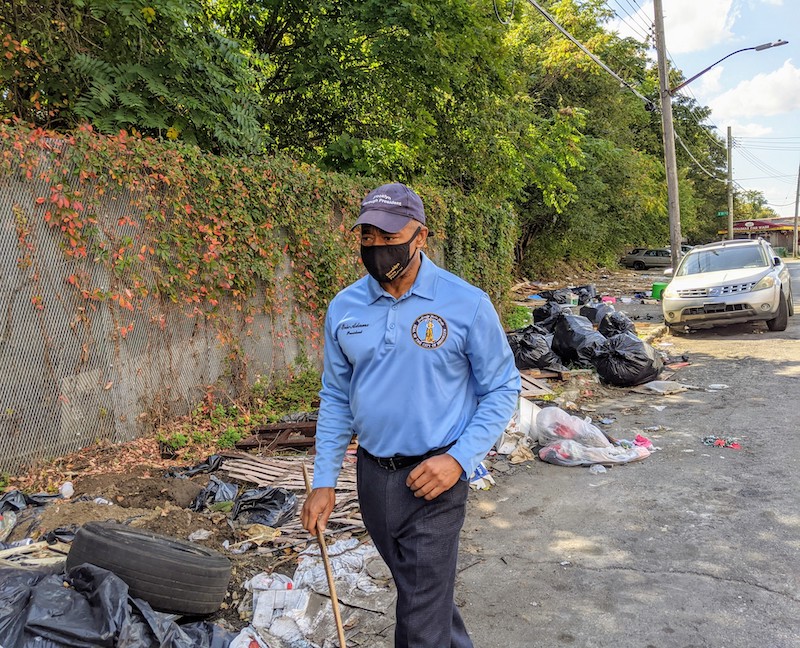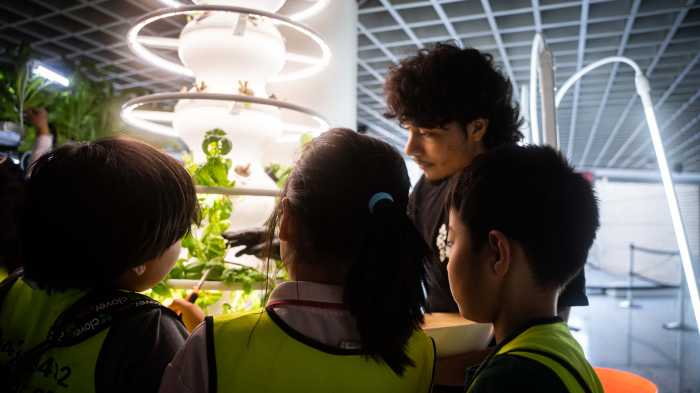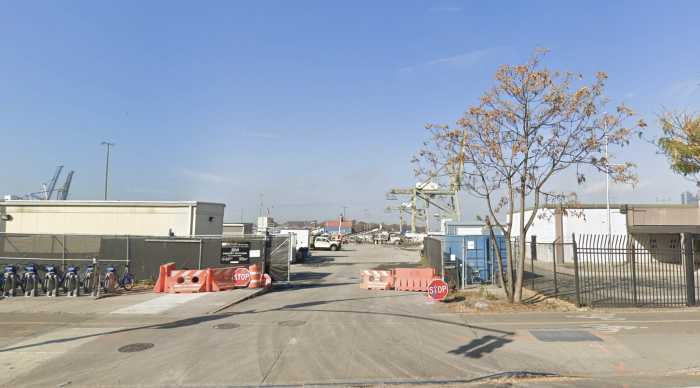Brooklyn Borough President Eric Adams yesterday called for a series of neighborhood corridor cleanups and strengthening security around known illegal dumping sites to counter cuts to the Department of Sanitation (DSNY) budget, resulting in reduced staff, trash can collection, curbside composting, and the closing of special waste sites in the city.
Adams’ call to action came as he toured Bushwick and East Flatbush yesterday, Oct. 4 to speak with residents in neighborhoods where trash and illegal dumping has been piling up.
At the Good Life Garden, located on the corner of Goodwin Place and Grove Street, Founder Kofi Thomas showed Adams the resiliency of the community garden and how people have come together to address sanitation in the neighborhood in the past and present. Trash has been reportedly piling up in front of businesses along Broadway.
“This is a testament to what happens when the community organizes, gets together, and makes a change,” said Thomas. “This garden was once for trash, demolition, and people have passed out here, you know, I’ve seen overdoses. But through cleaning it up, coming together to have real conversations with our neighbors we found that we can change.”
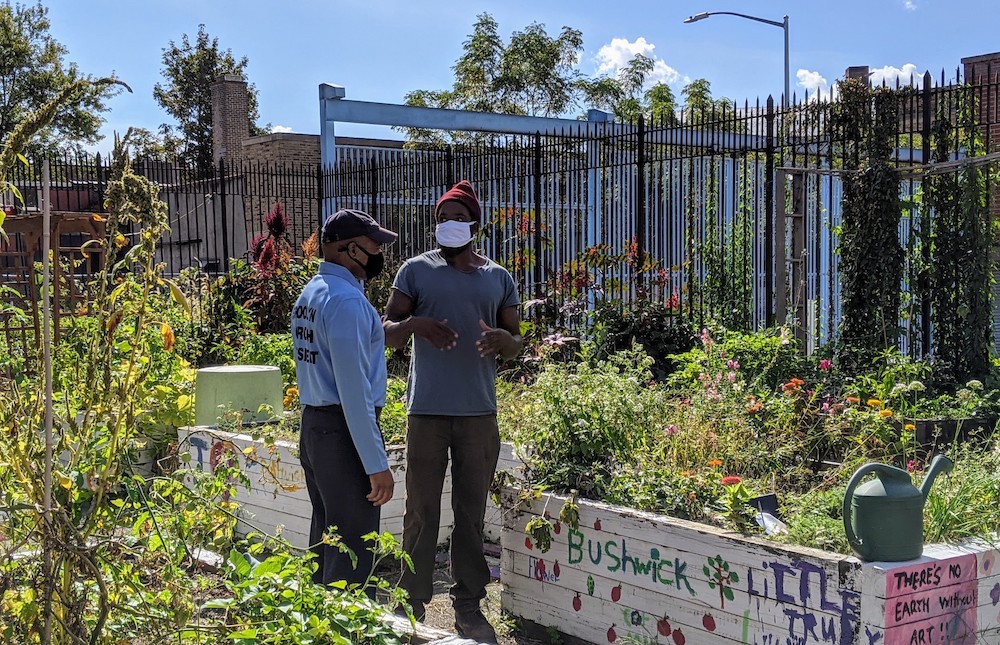
Adams said he was excited to see civic groups and local residents coming together and that Thomas’ work with the garden is an important element to transforming neighborhoods.
“I really want to thank all the community organizations that we acknowledged for coming together and assuring that the quality of life can not go backwards. Trash, graffiti, the uncertainty of pickups, unclean streets, all of that plays on the psyche of New Yorkers as we deal with the trauma of COVID-19,” said Adams.
Adams said he’s inspired and concerned about the community’s needs.
“I believe the lack of coordination by DSNY and not having real communication on the ground with these community groups, it’s really having us lose our best asset, the people. If we stop existing silos and coordinate with the people on the ground during these difficult times even with budget cuts, we can do a better job,” said Adams.
Adams said that civic groups and businesses and everyday residents have been doing their part despite cuts to sanitation. “But if we are honest prior to the cuts, we were not managing our assets correctly and so we can’t merely point to the pandemic or cuts and state that this is the reason,” said Adams, “We were having this problem long before coronavirus, this is not about COVID.”
Adams pointed out that the cuts led to a dramatic reduction in the amount of pickups. “We went from 736 to 272, that’s a horrendous drop and numbers of trucks are being deployed for litter collection,” said Adams.
According to the DSNY’s monthly tonnage data from September 2020, Brooklyn is on average the third largest for trash collection, behind Staten Island and Queens. The neighborhood with the least trash picked up this year so far has been in Coney Island, presumably since the area was closed for most of the summer. The areas with the record highest so far have been in Canarsie, Flatlands, and Georgetown.
Adams said the city should be leveraging every asset it has including updating old systems for complaints, youth initiatives, and even employing the National Guard, to empower communities and keep them clean.
“Now more than ever, we count on our fellow New Yorkers to be our partners in keeping the city healthy, safe and clean. Property owners have a moral and legal responsibility to keep their property clean (Including the sidewalk and extending 18 inches into the street). Additionally, residents and businesses must dispose of unwanted material in the proper way – again, it’s a legal and moral responsibility,” said DSNY Director of Communications Belinda Mager.
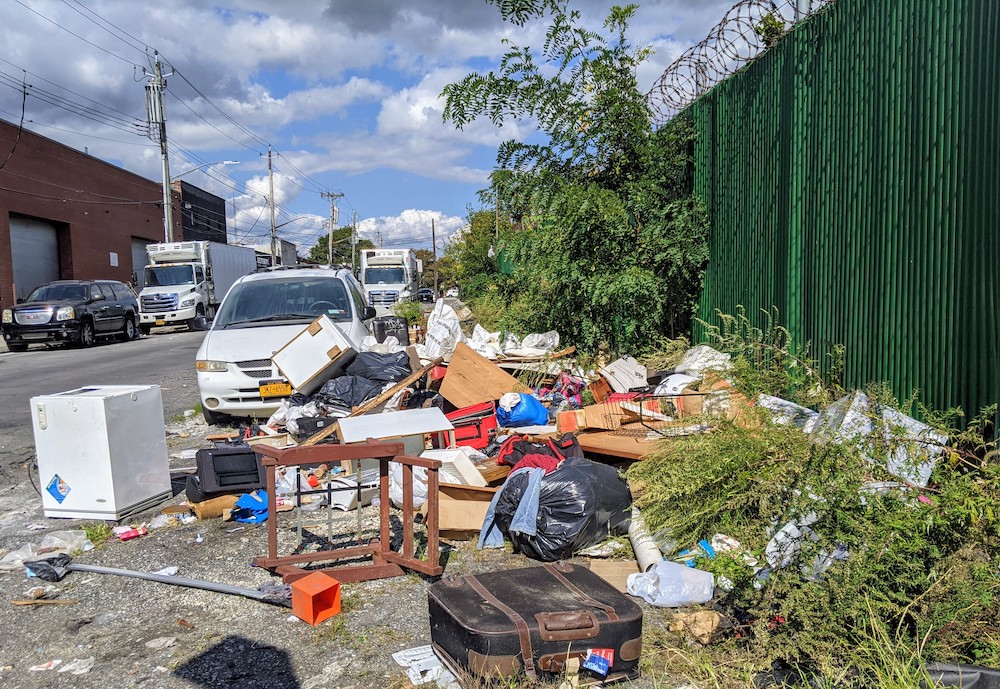
On the other side of Brooklyn, Adams and his team later walked through a long-neglected section of Farragut Road between Utica Avenue and Kings Highway in East Flatbush that’s become a vast dumping site from end to end. “It’s very alarming,” said Adams about the situation.
“One of the problems is that people who dump garbage make a decision that, ‘we can either dump it legally or we can find a location where we don’t have to pay.’ Once they find that they just repeatedly do it,” said Adams, picking at what he identified as construction garbage. The garbage included doors, glass, food, clothes, TV monitors, pallets, wood, old torn up gravel and concrete piles, and mattresses. “We need to see if we can partner with these businesses and catch people in the act.”
The area falls into a gray ‘no man’s land’ between agencies, properties, and community boards. It also doesn’t show up on the city’s Department of Health and Mental Hygiene’s (DOHMH) site for rat inspections, compliances, and clean ups.
The sole property on the back road is located on the corner at 1437 Utica Avenue. On January 13, 2018, said FDNY, at 7 a.m. an electrical fire engulfed the car wash, taking 25 units and 106 members to the scene. What’s left is a burnt out husk filled with trash and seemingly abandoned cars stretching into a patch of wooded trees with an old LIRR freight line running above. It’s currently under penalty with the Department of Buildings (DOB) for multiple violations and is marked for demolition by the Department of Housing Preservation and Development (HPD).
Residents and community organizers, like Anthony Beckford in the 45th District, have tried consistently to call attention to the problem area.
“People come and they clean and it doesn’t matter if it goes right back,” said one local worker at a nearby car shop across the street. Many locals vaguely remembered the fire but dejectedly spoke about the major trash problem on the street. He said that it must happen at night often because he doesn’t see illegal dumping happen during the day.
Adams noted that overall interagency cooperation would be more beneficial to beating back general trash and illegal dumping issues.
Adams said his office will look into partnering with the surrounding businesses with existing cameras and use the Safe Shopper program to install more security and ask DSNY to charge people.


